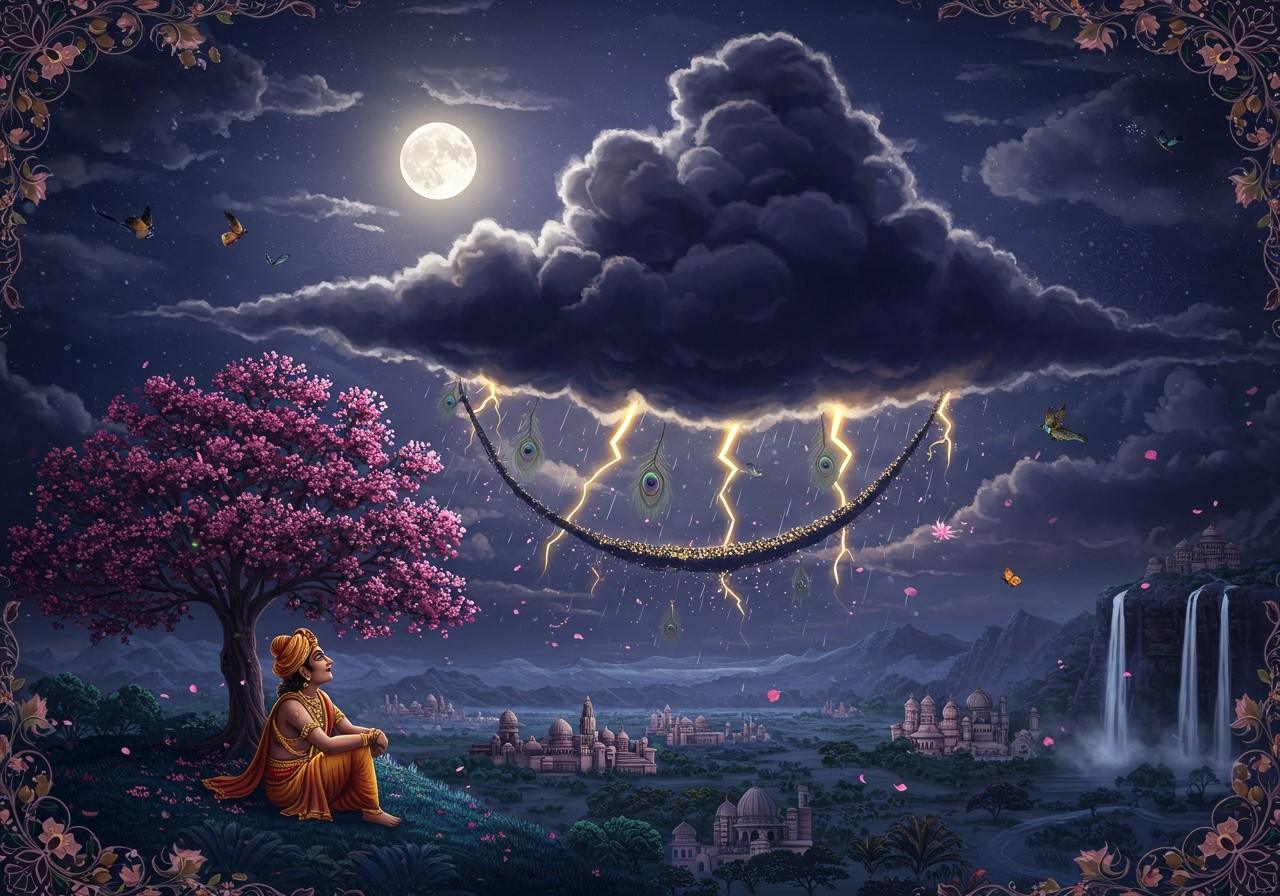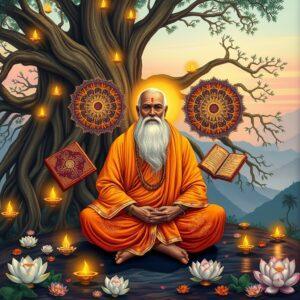
The Meghadūta, often translated as “The Cloud Messenger,” stands as a testament to the poetic genius of Kālidāsa, a celebrated Sanskrit poet. Composed of 111 stanzas, this lyrical masterpiece is divided into two parts: Purvamegha (Previous Cloud) and Uttaramegha (Consequent Cloud). The poem follows the story of a yaksha, a nature spirit, separated from his beloved wife. In his yearning, he implores a passing cloud to carry a message of love across the vast expanse to her.
A Summary of the Meghadūta
The Meghadūta unfolds in two parts: Pūrva-megha and Uttara-megha. Pūrva-megha paints a vivid picture of the cloud’s journey across India, detailing the landscapes, rivers, and cities it encounters. The yaksha, exiled for neglecting his duties, pours his longing into a message entrusted to the cloud. Uttara-megha focuses on the emotional journey of the cloud as it carries the yaksha’s message, and the eventual reunion it promises. The poem beautifully captures the pain of separation and the enduring power of love.
Analyzing the Meghadūta
Kālidāsa masterfully employs literary devices such as similes and metaphors, bringing the natural scenery to life. The cloud becomes more than a meteorological phenomenon; it symbolizes a messenger of hope, bridging the physical and emotional distance between the separated lovers. The poem’s exploration of love, longing, and the human condition resonates deeply with readers. Kālidāsa’s portrayal of love is both delicate and intense, capturing the complexities of this universal emotion. The poem is enriched further by its cultural and historical context, providing layers of meaning for those seeking a deeper understanding.
Themes Woven Through the Meghadūta
Love and separation are the central themes of the Meghadūta. Nature plays a crucial role, not merely as a backdrop but as a facilitator of communication and an embodiment of emotion. The poem also touches upon spiritual and philosophical undertones, exploring themes of duty, consequence, and the interplay between human emotions and the natural world. The presence of divine and celestial beings adds a mystical layer, enriching the poem’s spiritual depth.
The Cultural Significance of the Meghadūta
The Meghadūta holds a revered place in Indian cultural heritage. Its influence on Sanskrit literature and subsequent poetic traditions is undeniable. Even in contemporary times, the poem’s relevance persists, inspiring modern works and reminding us of the enduring power of classical literature. It is a poem that continues to resonate with readers across generations, offering solace, understanding, and a deep connection to the human experience.
Connecting with the Spiritual Essence of the Meghadūta with Poojn.in
At Poojn.in, we offer a curated selection of authentic puja items to deepen your connection with the spiritual themes of the Meghadūta. Enhance your experience with these offerings:
- Dhoop and Incense Sticks: Create a serene atmosphere for reflection with our pure sandalwood dhoop sticks, reminiscent of the fragrant descriptions in Kālidāsa’s poetry. These aromatic offerings can transport you to the very landscapes described in the Meghadūta, enhancing your immersive experience.
- Brass Oil Lamps: Illuminate your study of the Meghadūta with traditional brass oil lamps, symbolizing the light of knowledge and the burning intensity of love depicted in the poem. The soft glow of these lamps can create a sacred space for contemplation.
- Pure Cotton Asanas: Find comfort and focus during meditation with our pure cotton asanas. These traditional prayer mats provide a grounding connection as you contemplate the themes of separation and devotion central to the Meghadūta.
Visit Poojn.in to explore our full collection. We offer secure online shopping and pan-India delivery.
Understanding the Meghadūta: FAQs
What is the Meghadūta about? The Meghadūta narrates the story of a yaksha, exiled from his wife, who sends a message of love and longing through a passing cloud.
Who wrote the Meghadūta? Kālidāsa, one of the most celebrated Sanskrit poets, composed this lyrical masterpiece.
What are the main themes? Love, separation, nature’s beauty, duty, and the interplay between the human and divine are central themes.
Conclusion
The Meghadūta remains a timeless masterpiece, inviting readers on a journey of love, longing, and the beauty of the natural world. Its enduring themes and evocative imagery continue to resonate with audiences across generations, making it a cherished gem of Indian cultural heritage.


